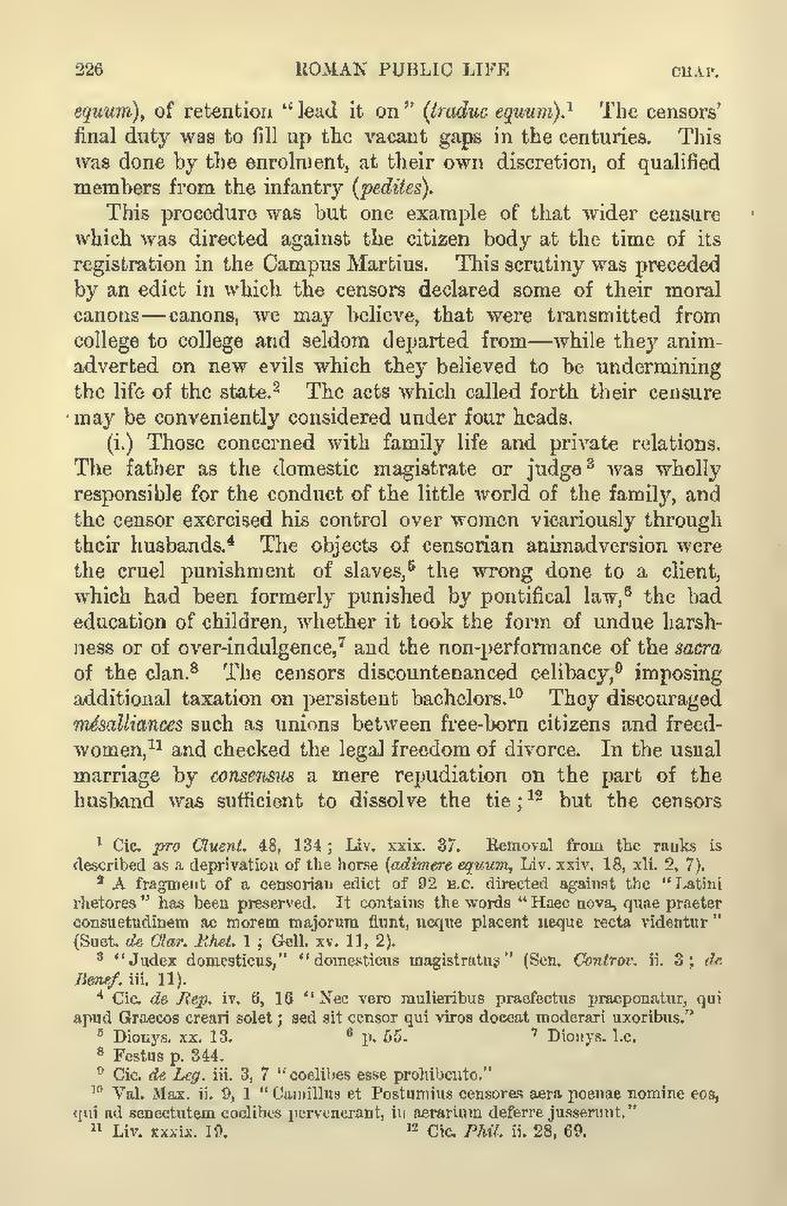equum), of retention "lead it on" (traduc equum).[1] The censors' final duty was to fill up the vacant gaps in the centuries. This was done by the enrolment, at their own discretion, of qualified members from the infantry (pedites).
This procedure was but one example of that wider censure which was directed against the citizen body at the time of its registration in the Campus Martius. This scrutiny was preceded by an edict in which the censors declared some of their moral canons—canons, we may believe, that were transmitted from college to college and seldom departed from—while they animadverted on new evils which they believed to be undermining the life of the state.[2] The acts which called forth their censure may be conveniently considered under four heads.
(i.) Those concerned with family life and private relations. The father as the domestic magistrate or judge[3] was wholly responsible for the conduct of the little world of the family, and the censor exercised his control over women vicariously through their husbands.[4] The objects of censorian animadversion were the cruel punishment of slaves,[5] the wrong done to a client, which had been formerly punished by pontifical law,[6] the bad education of children, whether it took the form of undue harshness or of over-indulgence,[7] and the non-performance of the sacra of the clan.[8] The censors discountenanced celibacy,[9] imposing additional taxation on persistent bachelors.[10] They discouraged mésalliances such as unions between free-born citizens and freed-women,[11] and checked the legal freedom of divorce. In the usual marriage by consensus a mere repudiation on the part of the husband was sufficient to dissolve the tie;[12] but the censors
- ↑ Cic. pro Cluent. 48, 134; Liv. xxix. 37. Removal from the ranks is described as a deprivation of the horse (adimere equum, Liv. xxiv. 18, xli. 2, 7).
- ↑ A fragment of a censorian edict of 92 B.C. directed against the "Latini rhetores" has been preserved. It contains the words "Haec nova, quae praeter consuetudinem ac morem majorum fiunt, neque placent neque recta videntur" (Suet. de Clar. Rhet. 1; Gell. xv. 11, 2).
- ↑ "Judex domesticus," "domesticus magistratus" (Sen. Controv. ii. 3; de Benef. iii. 11).
- ↑ Cic. de Rep. iv. 6, 16 "Nec vero mulieribus praefectus praeponatur, qui apud Graecos creari solet; sed sit censor qui viros doceat moderari uxoribus."
- ↑ Dionys. xx. 13.
- ↑ p. 55.
- ↑ Dionys. l.c.
- ↑ Festus p. 344.
- ↑ Cic. de Leg. iii. 3, 7 "coelibes esse prohibento."
